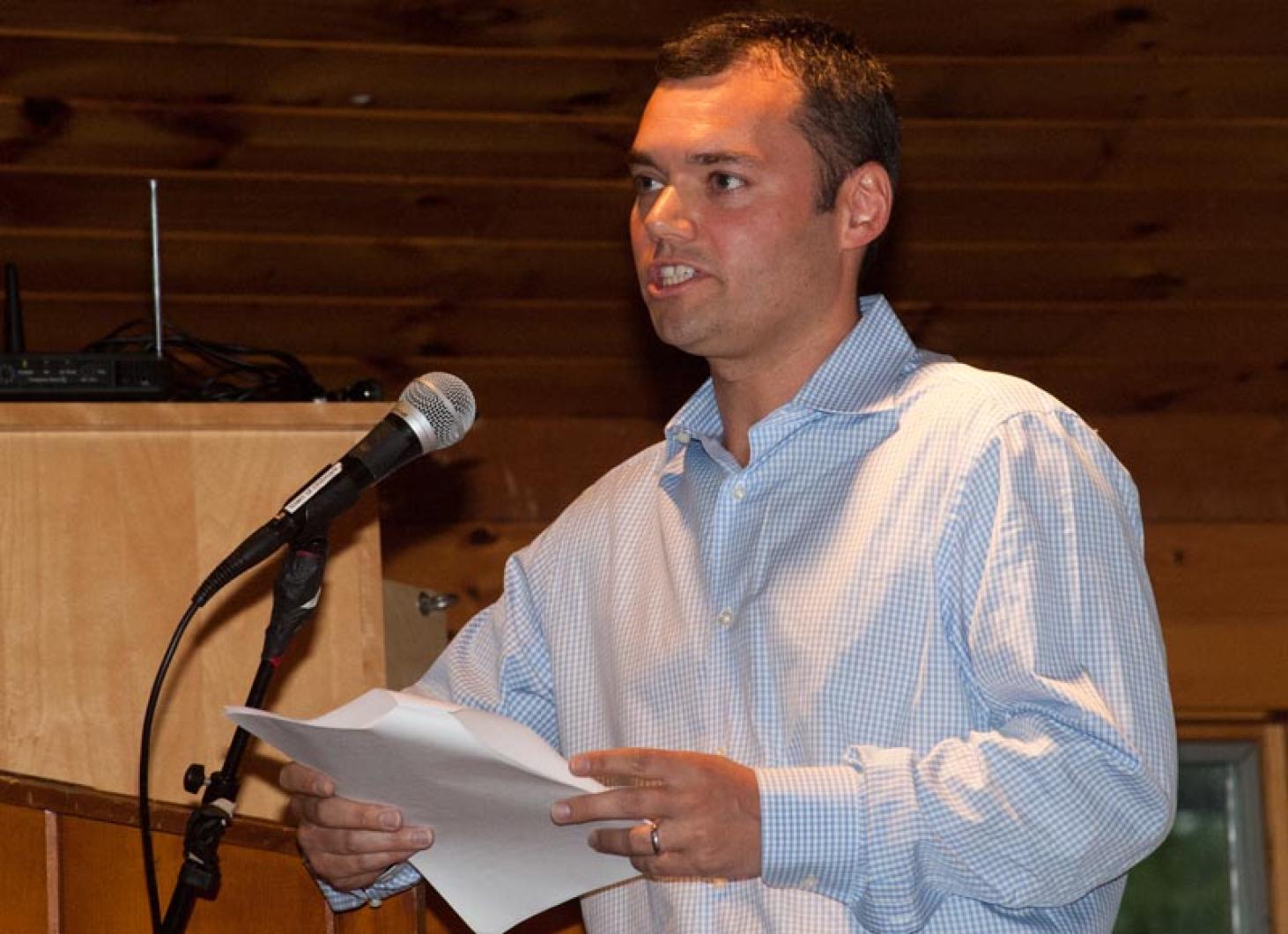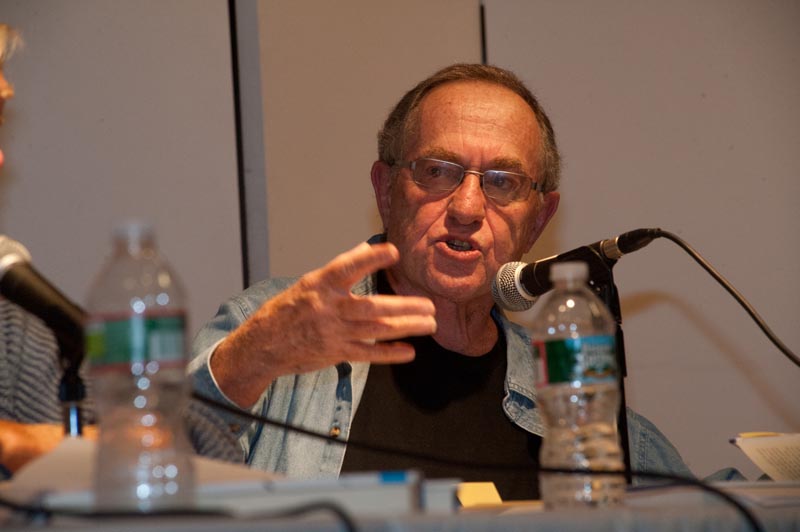It was a Chilmark showdown Sunday night: on one side was the noted civil liberties lawyer, law professor and author Alan Dershowitz. On the other was author Peter Beinart, an associate professor of journalism and an editor at the Daily Beast.
The debate centered on Mr. Beinart’s recent book, The Crisis of Zionism, and differing views about the future of Israel. A large crowd at the Chilmark Community Center watched the two spar, sometimes heatedly, in a debate moderated by author Richard North Patterson.
Israel is “a vibrant democracy and moral authority,” Mr. Dershowitz said, adding that it shouldn’t be singled out for condemnation.
Mr. Beinart countered that Israel’s occupation of the West Bank threatens Israel’s status as a democracy, and advocated for greater religious education for American Jewish people and a boycott of products from occupied territory. Mr. Dershowitz vehemently disagreed.
And on went the evening of sparring.
The event was part of the center’s summer author lecture series. In her opening remarks, Martha’s Vineyard Book Festival and author series founder Suellen Lazarus noted that Mr. Patterson, a seasonal resident, had thoroughly prepared for the discussion.
Mr. Patterson, who called himself “a gentile from West Tisbury,” said the issue of the survival of Israel as a Jewish democracy, was “of tremendous moral importance to all of us” and he aimed to “have a dialogue worthy of the subject” that left everyone more informed.
“This is an election year. These are very, very serious times with all kinds of problems,” he said.
Mr. Beinart and Mr. Dershowitz each presented their case for 15 minutes, followed by 30 minutes of questions for each other. Mr. Patterson then asked questions, followed by questions submitted in writing by the audience.
Mr. Beinart said Israel’s accomplishments are “being put at risk by Israeli settlement in the West Bank, and the resulting threat to Israel’s character as a democratic Jewish state.”
He said the democracy was threatened, and that the failure to create a two-state solution makes threats against Israel stronger. He added that the occupation of the West Bank is “contrary to the vision of Israel’s founders” because citizenship is ethnically-based.
“I want to be clear . . . the Palestinians do bear significant blame for the failure to achieve the two-state solution,” he said. “The Palestinians have badly undermined their cause through the terrorism that I call in my book grotesque and unforgivable.”
Mr. Beinart called it unlikely that an American president will put pressure on Israel, and he proposed a boycott of products from settlements, suggesting that people purchase and affirm products of democratic Israel.
While his book has prompted tough discussions, including some disagreements with family members, he concluded: “I’m more worried about the conversations I’ll have one day with my children and grandchildren if we let the dream of a democratic Jewish state die.”
Mr. Dershowitz, whom Mr. Patterson called a passionate defender of Israel, said he agreed with much of what Mr. Beinart said, and added that he was reluctant, at first, to appear, as “I have tried my best to stay out of this controversy.”
He recommended Mr. Beinart’s book, but said “I’m here tonight to help you read it critically . . . there’s a lot of common ground between us.”
Mr. Dershowitz said Mr. Beinart’s book has been popular among “real Israel haters,” and took issue with two proposals in particular: the call for the boycott of products occupied territory, and another proposal that the U.S. government should pay for religious education.
The boycott “is sending a very powerful moral message to the rest of the world,” he said, that could easily be misunderstood.
But Mr. Dershowitz said Israel is far from the worst human rights offender. “No country faced with comparable threats has had a better record of human rights,” he said.
He had harsher words for Mr. Beinart’s suggestion that the American government should pay to support Jewish schools so that more non-Orthodox Jewish people will become more immersed in Jewish religion, he said, calling it “an extraordinarily controversial proposal that so violates my own liberal principles.”
“I will continue to fight for the strictest separation of church and state,” he continued, saying that Mr. Beinart seemed to think that the idea would create more moderate, progressive, liberal Jewish people like himself. “That’s not the way it works,” he said, noting that Israel pays for such education and “it’s an absolute disaster.”
During the question-and-answer segment, the two addressed a range of issues, in rapid-fire debate.
Mr. Dershowitz said boycotting goods from the West Bank was self-defeating, “won’t work and it will backfire . . . no?”
“No,” Mr. Beinart responded. He said the boycott provides the option of expressing opposition to the settlements while affirming Israel’s right to exist.
But Mr. Dershowitz said he didn’t agree with hearing that “Israel is the worst and has to be boycotted,” considering other occupations. “I’m not here to justify an occupation,” he said, but there’s a problem of perception when Israel is singled out. The boycott would be “contributing unintentionally to de-legitimating Israel,” he said.
“It’s true, Israel gets a lot of unfair excessive criticism,” Mr. Beinart said. “I just don’t think anyone operates like a computer, thinking through the 15 worst human rights violators in the world.”
“I do,” Mr. Dershowitz responded.
But Mr. Beinart said that he focuses on Israel, as Mr. Dershowitz does, because it is close to his heart. “I care a lot more about whether Israel survives as a democracy, frankly, than whether Egypt does,” he said, adding that people from a range of religions care about the area as “the birthplace of the three great monotheistic religions.” A round of applause rang out to end the exchange. “I thought that was what we came for,” Mr. Patterson said.
Mr. Dershowitz also said Mr. Beinart’s book did not focus enough on Iran. “It sounds like name-dropping and it is,” he said but while on a recent trip to Israel, President Barack Obama called to ask what Israelis are thinking about. Mr. Dershowitz said he responded: Iran, Iran, Iran.
The only thing that will help in that case, he said, is a credible American threat. “I support Obama on this.”
Beyond foreign policy, the two also said they drew on their own experiences. Mr. Beinart said he feels it’s a disgrace that more Jewish children in America don’t learn about their heritage. “I fear that we will not produce the Alan Dershowitzes of the future,” he said.
“Your prescription is that everyone should be Peter Beinart,” Mr. Dershowitz responded.
Mr. Patterson threw his hands up. The crowd laughed.
The discussion ended with a look ahead at the upcoming election; which candidate would be better for Israel?
Mr. Beinart said Mr. Obama has given Israel a great deal of advanced military technology, and the basic question comes down to what people believe is good for Israel: people who believe the American president should let Israel do “whatever it wants,” he said, should vote for Mitt Romney.
On the other hand, for those who believe in trying to help Israel “live up to its principals of independence, that it seems to me you have a better chance with Barack Obama,” he said.
“I don’t vote on who’s better for Israel, I vote on who’s best for the world and who’s best for the United States,” Mr. Dershowitz said. He declined to say for whom he would vote, but said they should strike the appropriate balance between acknowledging threats and security concerns “while at the same time nudging [Israel] toward a more ethical approach.”
“I think we’ve had a remarkable discussion,” Mr. Patterson said.
With that, the authors shook hands with the moderator and each other, and headed to the lobby to sell books. And audience members, some continuing their own discussions, headed into the night.








Comments
Comment policy »